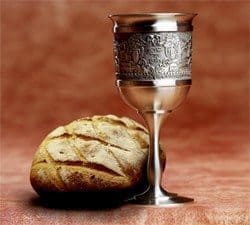This Table is a table of love and fellowship. God has set it so that we may sit around it and willingly (that is, lovingly) partake of it. In partaking of it in faith, we are partaking of Christ, partaking of one another, and partaking of the bread and wine. When we are done, Christ is not diminished. When we are done, we are not diminished but rather we have grown. The bread and wine are not gone, but rather we find an abundance of bread and wine always around us, with which we are enabled to go out and feed the world. When we partake in this way, the blessings are added and multiplied. God is the one who gives the increase.
This is what love always does. But when Christians turn away from the kind of love which partakes, they find that they are not able to turn away from eating. But the nature of the eating is entirely transformed. In Galatians 5, Paul tells the saints not to use their liberty as a way of serving their own flesh, but rather to serve one another in love (v. 13). He then says that they are called to love their neighbors as they do themselves (v. 14). The alternative to this, he says, is biting and devouring, with the end result of being consumed.
The word for consumed means destroyed, annihilated, done away with, utterly consumed. It has the opposite effect that partaking does. When we partake of one another, sacrificing ourselves to one another, offering ourselves to one another, there is always more when we are done. When we bite and devour, when we are done, we are done.
We grow through sacrifice, gift, and grace. We shrink and diminish through grasping. These two ways of eating are entirely at odds. They are at war with one another. But one goes into battle with songs, and the other with snarls.
So come, and welcome, to Jesus Christ.


Amen!
When the Reformation happened, the Catholics were the ones who partook more rarely, and the Reformers were the ones pushing for more frequent observance. Calvin wanted weekly communion, but was unable to get Geneva to sign off. Rare communion is the pre-Reformation hold-over.
They celebrated the mass more frequently, but with just the priest partaking of the elements. There was little congregational communing. Weekly communion for all of God’s people is being more gracious with the means of grace!